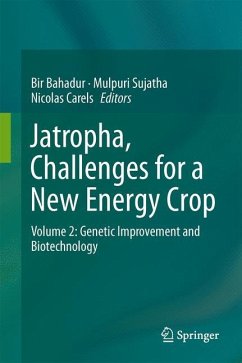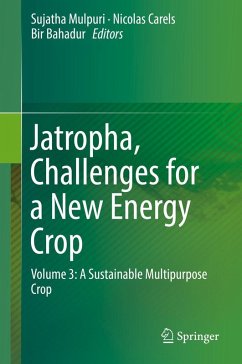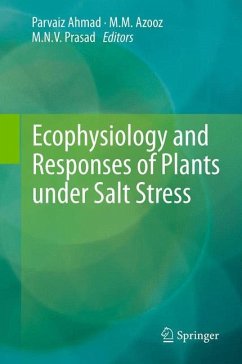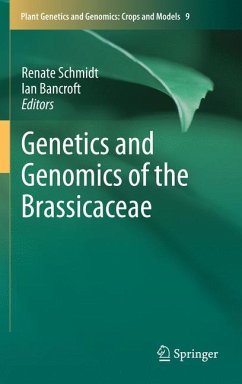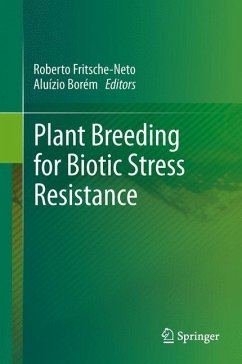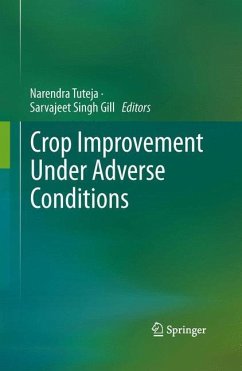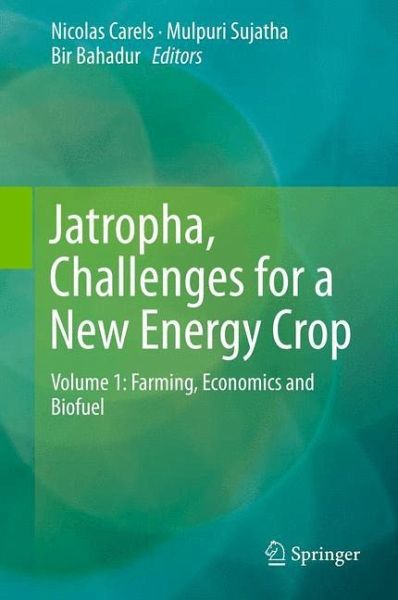
Jatropha, Challenges for a New Energy Crop
Volume 1: Farming, Economics and Biofuel
Herausgegeben: Carels, Nicolas; Sujatha, Mulpuri; Bahadur, Bir

PAYBACK Punkte
76 °P sammeln!
The book will be a broad and comprehensive look on Jatropha until the details since the book is being contributed by international experts worldwide that have already published works in the international press of Science. Illustrations, tables geographic maps, GPS location, etc are added by each contributors according to the feeling they have concerning what they think their contribution should be. This book will benefit the scientific community immensely. Being aware of any challenges related to Jatropha, i.e. (i) its economy in Asia (India, China) and South America (Brazil), (ii) basics of biofuel technology, (iii) physiology, (iv) farming, (v) byproducts, (vi) biotechnology, (vii) genetic resource (germplasm) and their benefit for the crop by genetic transfer, (viii) genetic map, (ix) comparative genetics, (x) genomics. Breeders and technologist will have access to a complete digested view on Jatropha to decide where and how they should move on with their investigations.
Jatropha, Challenges for a New Energy Crop Volume 1 aims to report on the state of the art of scientific investigations that were made during the past ten years on the new crop Jatropha curcas. The progresses obtained on the knowledge of this abstemious, semi-wild species are already impressive and were mainly achieved in just a decade (2001- 2011). This knowledge extends from basic Jatropha physiology and biological reproduction to the basic agronomic practices and systems for its productive management, but also the complete set of biotechnological tools, such as in vitro culture, genetic transformation, genomic sequence, genetic map, and markers assisted selection that are necessary for its selective breeding. These scientific and technological achievements paved the way for the future technological management and domestication of Jatropha as an industrial oilseed crop able to contribute to the feeding of the transport system.
This first volume of a two book series that form the first comprehensive compilation by global experts appeared necessary to us in view of the importance that Jatropha demonstrated worldwide by its large scale cultivation and emerging value for energy business as a biofuel. The book is presented in five units comprising 30 chapters covering the main aspects of the worldwide economic importance of Jatropha as well as its physiology, farming, oil processing, by-products, biodiesel, and biofuel combustion. It aims to give a kind of comprehensive picture on the whole productive chain of Jatropha and is supposed to help the reader to make a mental representation concerning the potential of Jatropha as a crop. By contrast, volume two is dedicated to Jatropha as a biological system with the purpose to understand what can be improved in Jatropha and how such improvement can be achieved. We believe and hope that this compilation will be a valuable source of inspiration for next generation scientists investigating this new crop, for technologists invested in improving its profitability as well as for decision makers and policy implementers involved in politics, economics, environment or social management that are thinking and acting for the development of a world based on sustainability.
This first volume of a two book series that form the first comprehensive compilation by global experts appeared necessary to us in view of the importance that Jatropha demonstrated worldwide by its large scale cultivation and emerging value for energy business as a biofuel. The book is presented in five units comprising 30 chapters covering the main aspects of the worldwide economic importance of Jatropha as well as its physiology, farming, oil processing, by-products, biodiesel, and biofuel combustion. It aims to give a kind of comprehensive picture on the whole productive chain of Jatropha and is supposed to help the reader to make a mental representation concerning the potential of Jatropha as a crop. By contrast, volume two is dedicated to Jatropha as a biological system with the purpose to understand what can be improved in Jatropha and how such improvement can be achieved. We believe and hope that this compilation will be a valuable source of inspiration for next generation scientists investigating this new crop, for technologists invested in improving its profitability as well as for decision makers and policy implementers involved in politics, economics, environment or social management that are thinking and acting for the development of a world based on sustainability.





